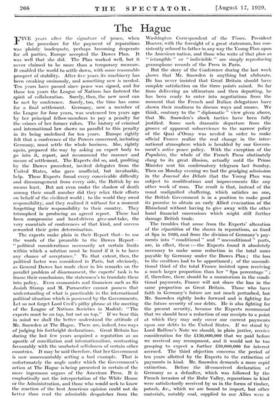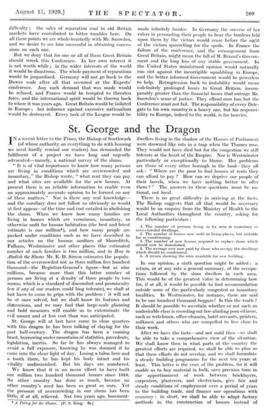The Hague
FIVE years after the signature of peace, when the procedure for the payment of reparations was plainly inadequate, perhaps becoming desperate for all parties, Europe accepted the Dawes Plan. It was well that she did. The Plan worked well, but it never claimed to- be more than a temporary measure. It enabled the world to settle down, with some reasonable prospect of stability. After five years its machinery has been creaking ominously, and something new is needed. Ten years have passed since peace was signed, and for those ten years the League of Nations has fostered the spirit of collaboration. Surely, then, the new need can be met by conference. Surely, too, the time has come for a final settlement. Germany, now a member of the League for four years, was sentenced ten years ago by her principal fellow-members to pay a penalty for the crimes of her former rulers. The history of criminal and international law shows no parallel to this penalty in its being undefined for ten years. Europe rightly felt that a conference of the Powers concerned, including Germany, must settle the whole business. She, rightly again, prepared the way by asking an expert body to go into it, report, and recommend the manner and means of settlement. The Experts did so, and, profiting by the Dawes precedent, invited delegates from the United States, who gave unofficial, but invaluable, help. These Experts found every conceivable difficulty and discouragement from every side, the British by no means least. But not even under the shadow of death among their small number did they relax their efforts on behalf of the civilized world ; to the world they owed responsibility, and they realized it without for a moment forgetting their responsibility to their country. They triumphed in producing an agreed report. There had been compromise and hard-driven give-and-take, the very essentials of conferences of that kind, and success rewarded their grim determination.
The experts make plain in their Report that—to use the words of the preamble to the Dawes Report- " political considerations necessarily set certain limits within which a solution must he found if it is to have any chance of acceptance." To that extent, then, the political factor was considered in Paris, but obviously, as General Dawes has made clear in his remarks on the parallel problem of disarmament, the experts' task is to frame their conclusions, the statesmen's to translate these into policy. Even economists and financiers such as Sir Josiah Stamp and M. Parmentier cannot possess that understanding of what is practicable in the international political situation which is possessed by the Governments. Let us not forget Lord Cecil's pithy phrase at the meeting of the League of Nations Societies in Madrid: "The experts must be on tap, but not on top." If we bear this in mind we shall the better understand the attitude of Mr. Snowden at The Hague. There are, indeed, two ways of judging his forthright declarations. Great Britain has during the last few years acquired a reputation as an apostle of conciliation and internationalism, contrasting favourably with the unabated selfishness of certain other countries. It may be said therefore, that her Government is now unaccountably setting a bad example. That is unfortunately the angle under which the Government's action at The Hague is being presented in certain of the more ingenuous organs of the American Press. It is emphatically not the interpretation of the White House or the Administration, and those whO would seek to knoi,k; the reaction of the best American opinion could not do better than read the admirable despatches from the. Washington Correspondent of the Times. President Hoover, with the foresight of a great statesman, has con- sistently refused to father in any way the Young Plan upon the American nation, and those who write of that plan as " intangible " or " indivisible " are simply reproducing gramophone records of the Press in Paris. '
But the story of the Conference during the last week shows that Mr. Snowden is anything but obdurate.
He has never insisted that Great Britain should have complete satisfaction on the three points raised. So far from delivering an ultimatum and then departing, he has been ready to enter into negotiations from the moment that the French and Italian delegations have shown their readiness to discuss ways and means. We think, contrary to the " diplomatic " view given above; that Mr. Snowden's shock tactics have been fully justified. Some such dramatic departure from the groove of apparent subservience to the narrow policy of the Quai d'Orsay was needed in order to make official France realize the real change in the inter- national atmosphere which is heralded by our Govern- ment's active peace policy. With the exception of the Populaire, the whole of the French Press obstinately clung to its great illusion, actually until the Prime Minister sent his confirmatory telegram last Sunday.
Then on Monday evening we had the grudging admission in the Journal des Debate that the Young Plan was subject to modifications and improvements like any other work of man. The result is that, instead of the usual undignified chaffering, which satisfies no one, the British Government is in a position to make good its promise to obtain an early Allied evacuation of the Rhineland without having to give away with the other hand financial concessions which might still further damage British trade.
The troubles that arose from the Experts' alteration of the reparation of the shares in reparations, as fixed at Spa in 1920, and from the division of Germany's pay- ments into " conditional " and " unconditional " parts, are, in effect, these :—the Experts found it absolutely necessary to make some reduction in the total sums payable by Germany under the Dawes Plan ; the loss to the creditors had to be apportioned ; of the uncondi- tional third of the total France insisted upon receiving a much larger proportion than her " Spa percentage " ; if, therefore, there should be a moratorium in the condi- tional payments, France will not share the loss in the same proportion as Great Britain. Those who have faith in Germany's future are not much perturbed, but Mr. Snowden rightly looks forward and is fighting for the future security of our debts. He is also fighting for the present security, because the Experts recommend that we should bear a reduction of our receipts to a point at which they may only cover our current payments upon our debts to the United States. If we stand by Lord Balfour's Note we should, in plain justice, receive consideration for the L150,000,000 that we paid before we received any recoupment, and it would not be too grasping to expect a further £50,000,000 for interest accrued. The third objection concerns the period of ten years allotted by the Experts to the extinction of payments in kind. Mr. Snowden demands a more rapid extinction. Before the ill-conceived declaration of Germany as a defaulter, which was followed by the French invasion of the Ruhr Valley, reparations in kind were satisfactorily received by us in the forms of timber, potash, &c., which we are bound to import, but other materials, notably coal, supplied to our Allies were a- difficulty ; the sales of reparation coal in old British markets have contributed to bitter troubles here. On all these points we are whole-heartedly with Mr. Snowden, and we desire to see him successful in obtaining conces- sions on each one.
But we deny that for one or all of them Great Britain should wreck this Conference. In her own interest it is not worth while ; in the wider interests of the world it would be disastrous. The whole payment of reparations would be jeopardized. Germany will not go back to the Dawes scale after all that occurred at the Experts' conference. Any such demand that was made would be refused, and France would be tempted to threaten force, and the international spirit would be thrown back to where it was years ago. Great Britain would be isolated in Europe ; her influence against excessive nationalism would be destroyed. Every task of the League would be made infinitely harder. In Germany the success of her rulers in persuading their people to bear the burdens laid upon them by the victors would cease before the sight of the victors quarrelling for the spoils. In France the failure of the conference, and the estrangement from Great Britain, might mean the fall of M. Briand's Govern- ment and the long loss of any stable government. In the United States uninformed opinion would naturally run riot against the incorrigible squabbling in Europe, and the better informed Government would be powerless to help. Retrogression back to instability would mean indefinitely prolonged losses to Great Britain, incom- parably greater than the financial losses that outrage Mr. Snowden's sense of justice. They offend ours too, but the Conference must not fail. The responsibility of every Dele- gate to his own country is a heavy one, but his responsi- bility to Europe, indeed to the world, is far heavier.

































 Previous page
Previous page